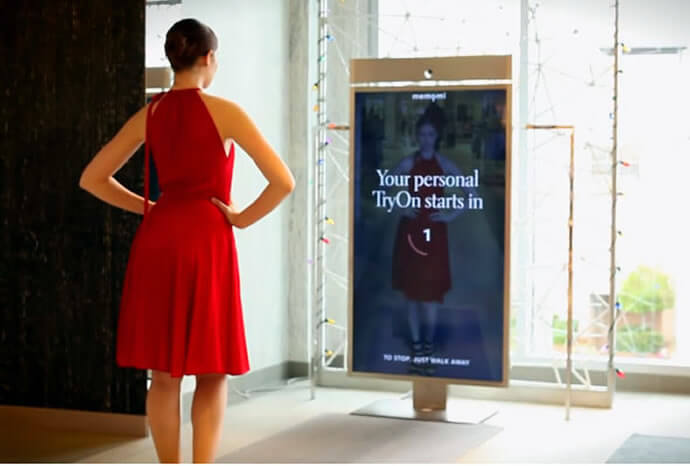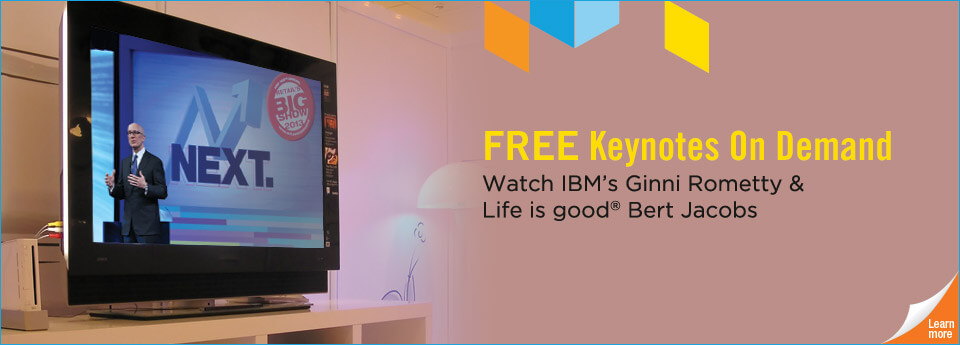The #NRF15 just wrapped up its biggest Retail’s Big Show to date at the Javits Center in New York City. The event boasted over 34,000 attendees from 85 countries around the globe, and featured over 300 “corner office” speakers from some of the world’s biggest, most powerful organizations. If you are in any way involved with retail innovation, this was a must-attend event.
If you weren’t there you missed a well-structured event jammed with valuable takeaways .
Here’s a little taste of what you missed:
Less is more: In an era of digitally-influenced shopping, selling less = more sales. That means it’s vital for retailers to use digital channels and digital media to enhance and complement the shopper experience (both in-store and online) without being “salesy”. Another way of putting this: your customer strategy should not differ from your digital one.
Deloitte studies back how important digital is to retail and omni-channel commerce.
Last year, $1,100,000,000,000 in retail sales were influenced by digital (that would be $1.1 Trillion)
Mobile influenced 19% of in-store sales in 2013 (that’s $593Billion!). If you read between the lines here, there’s a strong case for digital to be credited in attribution beyond mobile sales.
84% of customers use digital touchpoints either before or during a store visit
Conversion rates are 40% higher when shoppers use a digital touchpoint first (which can, in theory, debunk most “show rooming” theories)
Customers had 22% higher average order values when using digital as any touchpoint in the buying process
In-store technology is becoming table stakes: When I heard the CIO of TGI Fridays (Tripp Sessions) talk about what Friday’s’ is doing with in-restaurant technology (every Dub-Dub, or server, has a tablet for ordering), it made me want to go get a “Three-For-All” just to check out what’s new.
We’re seeing stores begin to use technology to promote and enhance in-store experiences and raise brand awareness. Every retailer wants people to love shopping both online and in-store, so seamlessly combining the best of both worlds is taking customer engagement to a new level.
Gap, Ascena Retail, GameStop, Kohl’s Chico’s FAS, Target and CKE Restaurants echoed the innovation in this sector, each utilizing some sort of in-store device that their customers are native to and accustomed to in their everyday environment.
Maurices’ uses iOS tablets around their stores to push for online ordering to happen in-store (a connection that bridges online and offline).
Chico’s FAS’ Boston proper stores are using “tech tables” cozied up near dressing rooms (intently put in the most social area of the store) so customers and in-store stylists can browse the full range of catalog products on a large screen (without eyes darting on your back and watching what you do).
Target associates use devices to pinpoint exactly where an item is in-store. For instance, if you walk up to an associate, hand him your smartphone with an item you found online and say “where can I find this?”, they’ll tell you exactly which aisle and location it’s in. Pretty helpful in a time-pressed world!
Kohl’s has begun to roll out beacon technology to send customers relevant and timely SMS messages while experiencing the brand in-store. Others, such as the Gap, are also engaging iBeacon technology, but think retailers can be more innovative with it. Roger Kibbe, Sr. Director of Omnichannel Architecture for the Gap said “If I walked into a store and got an SMS that said ‘Hey there, welcome to Old Navy!’, I’d probably turn my notifications off.”
 Something else that really struck me as awesome is the magic mirror – a mirror that helps shoppers decide what to buy without actually having to try it on! This was probably the feature that had the longest line at the 2015 Big Show. UniQlo has them in-store already!
Something else that really struck me as awesome is the magic mirror – a mirror that helps shoppers decide what to buy without actually having to try it on! This was probably the feature that had the longest line at the 2015 Big Show. UniQlo has them in-store already!
A couple notes and best practices to keep in mind when thinking about how to implement technology in-store to enhance the digitally enabled in-store experience are:
- Test before you invest! Start small, get results, and strategically roll them out.
- Think about your customer first. You want to avoid ‘creepy’ and you want to avoid anything that could be considered annoying or a nuisance. What demo are you dealing with, and what technologies make those people’s lives easier?
- Don’t interrupt the purchase experience with technology. Augment and complement it.
- Be relevant with content and messages. Be helpful. That’s how you win new fans and retain the holy grail of customer loyalty.
Customer data privacy and device security are imperative. If you’re going to control or hold any type of information about your consumer, remember that a device can be stolen. Severe protocol and protection enablement are vital in your technology – your customer wants to feel safe.
Customer Service is a huge differentiator. The primary goal for every retailer is that their customer have a delightful shopping experience. This holds true far before and far after the actual point of purchase. Retailers are looking at ways to improve their retail environments online and in-store in a manner that reflects respect for each customer.
Rent-A-Center is focusing on the talent of its in-store associates since the business is less focused on e-commerce and more honed in on getting folks to their stores. They’ve made way for a new title in the organization – Chief Customer Officer. That responsibility is purely around customer satisfaction. They strive to know everything about their customers – first & last name, their friends, even information about the house they live in (because they offer same day delivery). Each of these data points gets RAC closer to creating more amicable environments for their shoppers, who are often at a delicate state after being turned down elsewhere. Herman Nell, Rent-A-Center’s CIO, stated “When you stop changing, you stop.” It’s a great, succinct motto retailers should abide by.
Social media was also mentioned as a key aspect to customer service by Kohl’s, Brooks Brothers, Macy’s and others. It’s a huge channel that isn’t given enough attention. So here’s a quick and dirty tip: If you’re a retailer, pay more attention to what people are saying. Not just as a whole, but each individual person that shouts you out on Twitter or leaves a review on Google Plus, etc. Every customer is important because their social circles touch hundreds, even thousands, of others. The customers’ share of voice is enormous. Listen to your customer.
To wrap up, it would take a novel to cover everything that was discussed at NRF’s 2015 Big Show. But in-store technology, customer service and digital enablement were some of the most pervasive topics. Still looking for more? You’ll find playback of the Keynote presentations below.
Contact DAC today to find out more!





